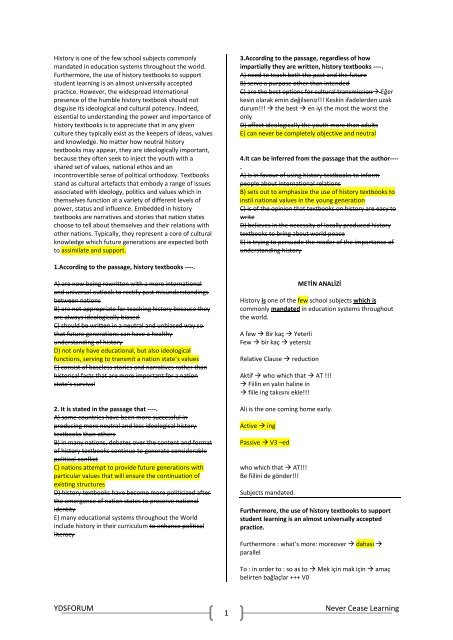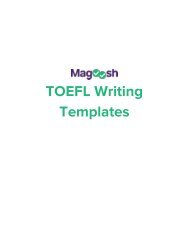Notlar
Create successful ePaper yourself
Turn your PDF publications into a flip-book with our unique Google optimized e-Paper software.
History is one of the few school subjects commonly<br />
mandated in education systems throughout the world.<br />
Furthermore, the use of history textbooks to support<br />
student learning is an almost universally accepted<br />
practice. However, the widespread international<br />
presence of the humble history textbook should not<br />
disguise its ideological and cultural potency. Indeed,<br />
essential to understanding the power and importance of<br />
history textbooks is to appreciate that in any given<br />
culture they typically exist as the keepers of ideas, values<br />
and knowledge. No matter how neutral history<br />
textbooks may appear, they are ideologically important,<br />
because they often seek to inject the youth with a<br />
shared set of values, national ethos and an<br />
incontrovertible sense of political orthodoxy. Textbooks<br />
stand as cultural artefacts that embody a range of issues<br />
associated with ideology, politics and values which in<br />
themselves function at a variety of different levels of<br />
power, status and influence. Embedded in history<br />
textbooks are narratives and stories that nation states<br />
choose to tell about themselves and their relations with<br />
other nations. Typically, they represent a core of cultural<br />
knowledge which future generations are expected both<br />
to assimilate and support.<br />
3.According to the passage, regardless of how<br />
impartially they are written, history textbooks ----.<br />
A) need to teach both the past and the future<br />
B) serve a purpose other than intended<br />
C) are the best options for cultural transmission Eğer<br />
kesin olarak emin değilseniz!!! Keskin ifadelerden uzak<br />
durum!!! the best en iyi the most the worst the<br />
only<br />
D) affect ideologically the youth more than adults<br />
E) can never be completely objective and neutral<br />
4.It can be inferred from the passage that the author----<br />
.<br />
A) is in favour of using history textbooks to inform<br />
people about international relations<br />
B) sets out to emphasize the use of history textbooks to<br />
instil national values in the young generation<br />
C) is of the opinion that textbooks on history are easy to<br />
write<br />
D) believes in the necessity of locally produced history<br />
textbooks to bring about world peace<br />
E) is trying to persuade the reader of the importance of<br />
understanding history<br />
1.According to the passage, history textbooks ----.<br />
A) are now being rewritten with a more international<br />
and universal outlook to rectify past misunderstandings<br />
between nations<br />
B) are not appropriate for teaching history because they<br />
are always ideologically biased<br />
C) should be written in a neutral and unbiased way so<br />
that future generations can have a healthy<br />
understanding of history<br />
D) not only have educational, but also ideological<br />
functions, serving to transmit a nation state’s values<br />
E) consist of baseless stories and narratives rather than<br />
historical facts that are more important for a nation<br />
state’s survival<br />
2. It is stated in the passage that ----.<br />
A) some countries have been more successful in<br />
producing more neutral and less ideological history<br />
textbooks than others<br />
B) in many nations, debates over the content and format<br />
of history textbooks continue to generate considerable<br />
political conflict<br />
C) nations attempt to provide future generations with<br />
particular values that will ensure the continuation of<br />
existing structures<br />
D) history textbooks have become more politicized after<br />
the emergence of nation states to preserve national<br />
identity<br />
E) many educational systems throughout the World<br />
include history in their curriculum to enhance political<br />
literacy<br />
METİN ANALİZİ<br />
History is one of the few school subjects which is<br />
commonly mandated in education systems throughout<br />
the world.<br />
A few Bir kaç Yeterli<br />
Few bir kaç yetersiz<br />
Relative Clause reduction<br />
Aktif who which that AT !!!<br />
Fiilin en yalın haline in<br />
fiile ing takısını ekle!!!<br />
Ali is the one coming home early.<br />
Active ing<br />
Passive V3 –ed<br />
who which that AT!!!<br />
Be fiilini de gönder!!!<br />
Subjects mandated.<br />
Furthermore, the use of history textbooks to support<br />
student learning is an almost universally accepted<br />
practice.<br />
Furthermore : what’s more: moreover dahası <br />
parallel<br />
To : in order to : so as to Mek için mak için amaç<br />
belirten bağlaçlar +++ V0<br />
YDSFORUM<br />
1<br />
Never Cease Learning
In order that : so that mek amacıyla +++ cümle<br />
However, the widespread international presence of the<br />
humble history textbook should not disguise its<br />
ideological and cultural potency.<br />
But: Yet : However: Nevertheless: nonetheless ama<br />
fakat lakin Zıtlık bağlaç<br />
Should meli malı Tavsiye<br />
Should : ought to : must : had better<br />
Should : Ought to tavsiye<br />
Had better yapsan iyi olur aksi taktirde sonuçları kötü<br />
olur --< tehdit<br />
Must çok güçlü bir tavsiye<br />
You must go to a doctor!!!<br />
Indeed, essential to understanding the power and<br />
importance of history textbooks is to appreciate that in<br />
any given culture they typically exist as the keepers of<br />
ideas, values and knowledge.<br />
As 5 anlama sahip!!!<br />
1: As: Since: Because : for sebep bağlaçları için<br />
çünkü<br />
!*** cümle başındaysa için<br />
*** cümle ortasında çünkü<br />
!!! for cümle başında kullanılmaz<br />
May modal<br />
1: Olasılık ihtimallerden ebilir <br />
You may be right sen haklı olabilirsin.<br />
2: İzin May I open the door? <br />
--< you may open the door!!!<br />
As: Since : Because : for için çünkü<br />
Cümle başında için<br />
Cümle ortasında çünkü<br />
Textbooks stand as cultural artefacts that embody a<br />
range of issues associated with ideology, politics and<br />
values which in themselves function at a variety of<br />
different levels of power, status and influence.<br />
THAT V O eksik olan ??? SBJ !!!<br />
özne durumunda olan bir relative clause who<br />
which that<br />
Which /// that <br />
Embedded in history textbooks are narratives and stories<br />
that nation states choose to tell about themselves and<br />
their relations with other nations.<br />
That R.c.<br />
2: As: While (Just as) iken Zaman bağlacı<br />
!!! 1: Zamna bağlacı Zaman uyumu ister!!<br />
As ……………………. Tomorrow ,, ……………………….<br />
PAST<br />
PRESENT & FUTURE<br />
!!! 2: Zaman bağlaçlarından sonar will would be going<br />
to shall!! gelmez!!! Simple present tense (geniş<br />
zaman)<br />
3: As: Such as : like gibi örneklendirme benzetme<br />
4: As olarak As your mother, I have every right to<br />
tell you what to do.<br />
Typically, they represent a core of cultural knowledge<br />
which future generations are expected both to<br />
assimilate and support.<br />
Both … and … hem o hem de o (2)<br />
Not only … but also sadece o değil aynı zamanda bu<br />
(2)<br />
Either … or … ya o ya da o (1)<br />
!!! NOT!!! Either … or … olumsuz cümlede<br />
kullanırsan neither … nor …<br />
Neither … nor … ne o ne de o (0)<br />
5: As dıkça dikçe As we grow older Büyüdükçe<br />
No matter how neutral history textbooks may appear,<br />
they are ideologically important, because they often<br />
seek to inject the youth with a shared set of values,<br />
national ethos and an incontrovertible sense of political<br />
orthodoxy.<br />
YDSFORUM<br />
2<br />
Never Cease Learning



